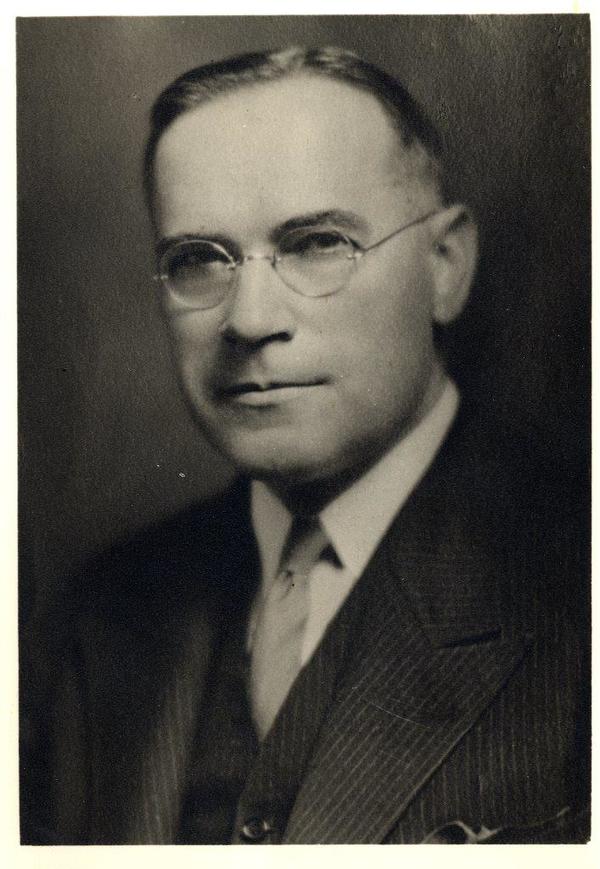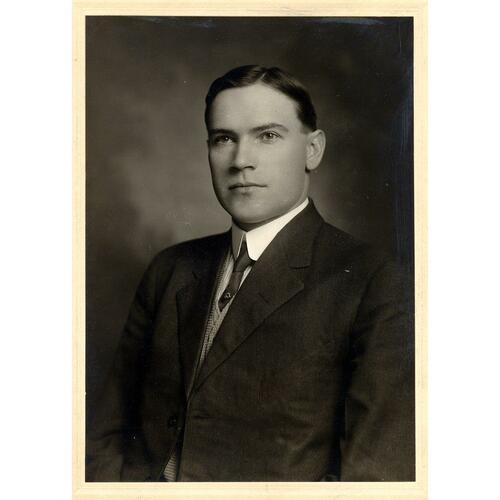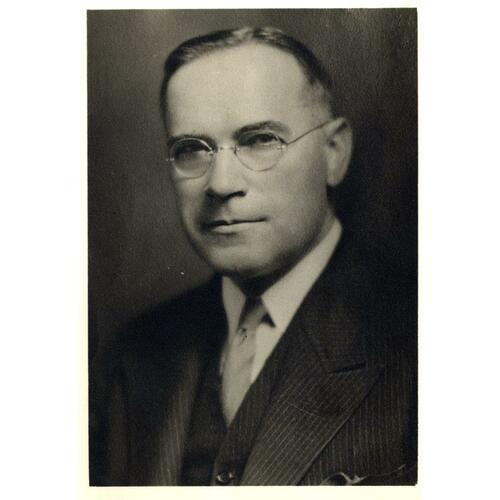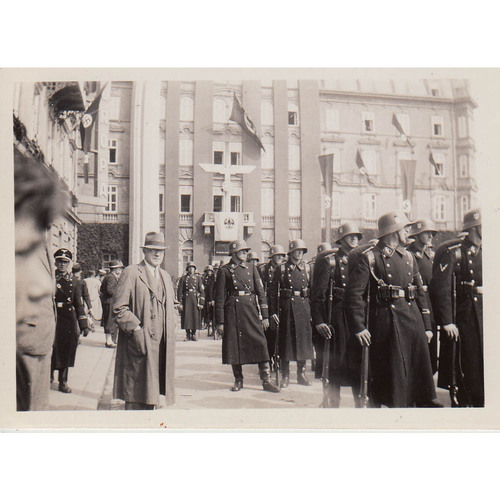
Source: Link
Wegenast, Franklin Wellington, teacher, musician, lawyer, politician, and author; b. 17 June 1876 in Waterloo, Ont., son of Martin Smith Wegenast and his second wife, Dinah Sauer; m. 14 Aug. 1901 Margaret Mary Bell (1878–1950) in Oxley, Ont., and they had three daughters and two sons, of whom only one daughter, Elsinor Louise, survived infancy; d. 2 June 1942 in Preston (Cambridge), Ont., and was buried in Oakwood Cemetery, Simcoe, Ont., beside the four children who had predeceased him.
Franklin Wellington Wegenast grew up in a German Canadian household with ties to the Evangelical Association, a Methodist group formed in the United States by members of the Pennsylvania Dutch community in 1800. (In later life he would become an Anglican.) At one point he boarded with an Amish family and this experience, in conjunction with his own evangelical background, encouraged a lifelong interest in the Mennonite faith. From his early years, he was involved with music. Said to have begun supporting himself at the age of 12, he nevertheless managed to graduate from high school in Berlin (Kitchener).
In 1898, having obtained a teacher’s certificate, Wegenast began his pedagogical career in Colchester South, Essex County. He also studied music and organized concerts at Harrow and Kingsville. In 1900, now living in Simcoe, he taught music in the public schools, gave private singing lessons, continued to put on concerts, and acted as choirmaster at St Paul’s Presbyterian Church. He also prepared for an associate diploma in singing at the Toronto Conservatory of Music [see Edward Fisher*], from which he graduated with honours in 1902. By that time he was residing in Woodstock and conducting the choir of Central Methodist Church there.
An interest in law had developed over the years, and Wegenast became articled to attorney John Soper McKay while in Woodstock. In 1905 he moved to Brampton and commuted to Toronto for courses in law at Osgoode Hall. In order to support himself and his wife, he became choirmaster of the Brampton Presbyterian Church, serving there until his resignation in 1915. For two years, in 1906–7, he conducted the Brampton Choral Society, and he also wrote music. He graduated from law school in 1909 and won Osgoode’s Christopher Robinson Memorial Prize. The following year he took the exams for an llb at the University of Toronto and passed with first-class honours.
In 1908, while still a law student, Wegenast had asked the Board of Railway Commissioners to compel the Grand Trunk Railway to include Brampton among the towns eligible for cheap commuters’ tickets to Toronto; the matter would eventually be taken, unsuccessfully, to the Supreme Court of Canada, where he helped present the case on behalf of the City of Toronto. After his graduation Wegenast joined the Brampton law office of Benjamin Franklin Justin, where he spent four months, practised alone for a similar length of time, and then became counsel to the Canadian Manufacturers’ Association (CMA), whose first legal department he organized. He remained with the association for seven years.
During his career he appeared in a series of actions involving constitutional law and the respective rights of the dominion and provincial governments. For example, he represented the CMA in the insurance reference case of 1912, which the Supreme Court of Canada decided the following year by ruling ultra vires the attempt by Sir Wilfrid Laurier*’s government to require federal licences for insurance companies operating in more than one province. He also argued before the Judicial Committee of the Privy Council in London, England, his first case being John Deere Plow Company v. Wharton in 1914, in which he was opposed by Edmund Leslie Newcombe*, who argued the federal side. War broke out while he was in England, and he stayed on for a time in the hope that his ability to speak German might help the British cause.
Wegenast had also represented the CMA during a three-year investigation into the liability of employers for workplace injuries, begun in 1910 by Commissioner Sir William Ralph Meredith*, and he subsequently prepared a draft of a workmen’s compensation bill for Ontario. The draft was rejected by Meredith, but the CMA was able to win some concessions as the commissioner’s own bill proceeded through the legislature. Wegenast drew up possible legislation in the same field for Nova Scotia and New Brunswick as well, and the compensation acts of these and other provinces were largely based on the bills he had formulated. In 1911 he brought out a pamphlet, Workmen’s compensation for injuries … (Toronto), and also a book, Extra-provincial corporations … (Toronto). Under the auspices of the CMA he later became involved in organizing safety groups in factories, and he would be for a time secretary to the Federation of Safety Associations – the precursor of Industrial Accident Prevention Associations, formed in 1917. His interest in workmen’s compensation gave his career a nationwide dimension, as did his involvement in insurance matters. According to the Bench and Bar in 1936, “He has had a hand in framing insurance legislation in all of the provinces.” In 1917 he was called to the Manitoba bar.
In the early 1920s Wegenast acted as secretary and legal adviser to the commission investigating the operations of the Hydro-Electric Power Commission of Ontario [see Sir Adam Beck*]. He focused as well in this decade on the writing of a book on company law. Margaret Paton Hyndman*, who had joined his firm in 1920, worked closely with him on this project. Wegenast’s support of a young woman practitioner was unusual at the time. The book, The law of Canadian companies, was published in Toronto in 1931. Two years later Wegenast was made a kc.
A long-time member of the Peel Liberal Association, Wegenast sat on the Brampton town council for many years from 1909, was reeve in 1923 and 1924, and served as mayor from 1925 until 1928 and again in 1930. He beautified the southern entrance to the commercial district by straightening the creek that ran through the area and building retaining walls for it. From 1914 to 1917 he was president of the local Board of Trade. A member of the Brampton Horticultural Society, he enjoyed landscape gardening, and he kept sheep, ducks, and horses on his property, which consisted of 25 acres on Highway 10 (Main Street). While he had less time for music, he still managed to sing at concerts; as late as 1940 he would be a soloist at the Brampton Presbyterian Church. A linguist who was fluent in French as well as English and German, Wegenast studied Italian and then Chinese. Since he was able to speak Gaelic, having picked it up in J. S. McKay’s law office, many people in Brampton thought him a Highlander.
One of Wegenast’s clients was Alvin Ratz Kaufman*, owner of the Kaufman Rubber Company in Kitchener [see Jacob Kaufman*]. Philanthropically inclined, Kaufman gave to local charities and in 1931 founded the Parents’ Information Bureau. This organization sent out agents who offered advice on birth control as well as contraceptive devices at cost. The bureau’s service spread outside Kitchener, and in September 1936 one agent, Dorothea Palmer*, was arrested in Eastview (Ottawa) and charged under the Criminal Code with “offences against morality.” Kaufman was prepared to fight the case with all his resources. His interest in birth control stemmed from his concern with over-reproduction among the poor, his alarm at the power of the Roman Catholic Church, and his bias against French Canadians.
Some scholars have concluded that it was because Wegenast shared Kaufman’s eugenic views that he took the case. Evidence does not support this theory. Wegenast did not want to be involved in the trial: he had no interest in contraceptive campaigns or in related sterilization movements. Kaufman later claimed that he had had to persuade Wegenast, said to be in poor health, to appear in the action. Having agreed, Wegenast focused on the legal questions surrounding birth control as well as on the rights of women. He organized his arguments to prove that birth control was pro bono publico. “No one,” he stated bluntly, “is entitled to get up in this court and argue that the chief end of man is to bring into the world as many souls as possible to become baptized and to praise the Lord for ever and ever.” In March 1937 he won the case, thereby setting a legal precedent in the area of birth control. The trial apparently prompted an involvement in eugenics, for at some point he joined the Eugenics Society of Canada.
In the spring of 1938, after Wegenast had suffered a heart attack, Kaufman funded a four-month rest trip for him in Europe, during which he kept a journal of his impressions. After World War II broke out the following year, he became head of the enrolment section of the Brampton win-the-war committee; according to his daughter, also a lawyer, his professional practice nevertheless suffered because of his German background. In May 1942 he went to stay at the Preston Springs Hotel, a favourite haunt. Several days after his arrival he died there of kidney failure. His wife survived him for eight years and was buried beside him in Oakwood Cemetery.
Selections from Franklin Wellington Wegenast’s diary of his trip to Europe in 1938 have been published as Liberty is dead: a Canadian in Germany, 1938, ed. M. E. Derry (Waterloo, Ont., 2012). The essay for which he won the Christopher Robinson Memorial Prize, “The federal system,” was published in shortened form in the Canadian Law Times (Toronto), 30 (1910): 11–38, 121–27. His book The law of Canadian companies was reprinted in 1979 (Toronto) with a foreword by M. P. Hyndman. He is also the author of A brief on workmen’s compensation ([Toronto, 1912?]), which the Canadian Manufacturers’ Assoc. reprinted from Sir W. R. Meredith, Interim report on laws relating to the liability of employers to make compensation to their employees for injuries received in the course of their employment which are in force in other countries (Toronto, 1912). Some of his musical compositions are indexed at Library and Arch. Can., “Aurora: LAC’s library catalogue”: bac-lac.on.worldcat.org/discovery (consulted 23 Jan. 2019).
Arch. of Ont. (Toronto), C 81-1-0-29 (interviews with Margaret Hyndman); RG 80-5-0-289, no.5597. Private arch., Margaret [E.] Derry (Caledon, Ont.), Wegenast family papers. Univ. of Toronto Arch. and Records Management Services, A1973-0026/502 (89) (Wegenast, F. W.). Univ. of Waterloo Library, Special Coll. & Arch. (Ont.), GA 58 (Parents’ Information Bureau fonds), GA 138 (Augustine, Ham, Kaufman family fonds); GA 172 (Parents’ Information Bureau Ltd fonds: accrual 2005); WA 17 (Palmer, Dorothea coll.). Bench and Bar: the National Legal Newspaper (Montreal), May 1936: 3, 7. Evening Telegram (Toronto), 3 June 1942: 24. Globe and Mail, 1908–42, esp. 3 June 1942: 4. Peel Gazette (Brampton, Ont.), 4 June 1942: 1, 4. Toronto Daily Star, 1908–42, esp. 3 June 1942: 8. Angus McLaren, Our own master race: eugenics in Canada, 1885–1945 (Toronto, 1990). McKenzie Porter, “The legal lady,” Maclean’s, 15 July 1949: 15, 22–24.
Cite This Article
Margaret E. Derry, “WEGENAST, FRANKLIN WELLINGTON,” in Dictionary of Canadian Biography, vol. 17, University of Toronto/Université Laval, 2003–, accessed December 31, 2025, https://www.biographi.ca/en/bio/wegenast_franklin_wellington_17E.html.
The citation above shows the format for footnotes and endnotes according to the Chicago manual of style (16th edition). Information to be used in other citation formats:
| Permalink: | https://www.biographi.ca/en/bio/wegenast_franklin_wellington_17E.html |
| Author of Article: | Margaret E. Derry |
| Title of Article: | WEGENAST, FRANKLIN WELLINGTON |
| Publication Name: | Dictionary of Canadian Biography, vol. 17 |
| Publisher: | University of Toronto/Université Laval |
| Year of publication: | 2019 |
| Year of revision: | 2019 |
| Access Date: | December 31, 2025 |





